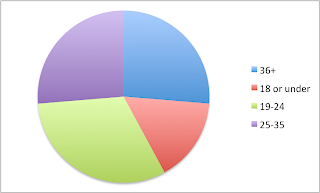At the beginning of Psychtember, I conducted a survey to get at what my readers' perceptions of psychological issues. Now I've taken a look at the results, made some pretty pie charts, and voila! Here they are for you to enjoy as well :)
First, some demographics:
Gender:
No surprises there :D
Age ranges:
I'm happy to see such a great variety of ages in my readers!
Educational background in psychology or related discipline:
And now for the actual questions:
1.)
As you can see, over 75% of the respondents think of something other than rats running in a maze, patients in a psychiatric ward, or Freud, when they hear the word "psychology." There were some great write-in responses to this one, including:
- Brain parts!
- College classes
- my Husband - a psych major!
- Things that mess with your head
- Someone saying "How does that make you feel?"
- Frasier!
2.)
The majority chose the response, "Psychotic? Really? I'm going to need a lot more proof than that," rather than, "Heck yes she's totally psychotic!! Who *does* something like that?"
Nice to see this result, since technically, there are no obvious signs of psychosis (having hallucinations and/or delusions) in the arch-rival's behaviour. She *could* be psychotic, theoretically, but she could have something completely different going on (some anger management issues, perhaps?) The word "psychotic" is tossed around in general conversation in a very casual way, giving it meanings that are actually completely inaccurate. It has nothing at all to do with being psychopathic, which is a whole other can of worms.
3.)
With this question I was getting at the different types of therapeutical orientations. 50% of the respondents think of a therapist and client sitting across from each other, the client
sharing his/her experiences while the therapist nods and says, "And how
do you feel about that?" This would be a humanistic/client-centered approach. 32% think of a therapist giving his/her client lots of information, trying out some
practice exercises with him/her, and then assigning the client homework. This represents cognitive-behavioural therapy (CBT).
And of course, the client on a couch while the therapist strokes his beard in thought is psychoanalytic therapy (the more traditional variety) —which very few of you picked!
There were also a few of you who gave your own responses, which included:
- A client telling a therapist how things have been since the last meeting
- A relationship that can, ideally, help the client understand herself better and lead a fuller, more conscious life
4.)
I loved the incredible variety of responses to this question! About 26% chose "Oh no, she's analyzing me right now, isn't she? I can tell!" and about 21% of you are fellow psych geeks (YAY!) but there were also a ton of creative write-in answers.
They ranged from the excited:
To the lukewarm:
- Cool?
- That it's cool, but I don't really think more about it than I do any other job.
- Interesting. Feel like sharing anything about it?
And then to the downright less-than-enthusiastic:
- Meh
- Pfft, that's what people major in when they don't know what they want to major in.
There were also a couple who took a more personal angle:
- Can you examine this or that issue I seem to have?
- I know more about her field than she does.
This question was getting at perceptions of OCPD and OCD — there's sometimes confusion between these, but they are separate disorders. It looks like most of you recognize this! OCPD involves a general mindset revolving around organization and perfection, but there are no specific obsessions and compulsions as there are in OCD.
6.)
I'm concluding from this that I have a large number of readers who are big Lord of the Rings fans and don't like to miss out on the fight scenes! :P
I included this question because schizophrenia is often confused with dissociative identity disorder (DID), and they are two COMPLETELY different issues. One of the primary symptoms of schizophrenia is psychosis, whereas with DID, the individual has multiple identities. Gollum has his alter ego Smeagol, for example.
7.)
The majority would be interested in hearing more about the book, but there were also a few write-in responses that wanted to know some specifics:
- Is it depressing?
- Option 1 followed by- But umm, how ACCURATE is it?! Is it gonna piss me off?!
- Which illness?
- Is he a victim or a monster?
What do you guys think of the results? Anything surprise you?












Some of those answers made me laugh. Like this one: Pfft, that's what people major in when they don't know what they want to major in. Surprisingly that's not the first time I've heard it :)
ReplyDeleteOh, I've never heard someone say that about psych majors. Some of these are funny. The thoughts on therapy are really interesting. As a psych major, I feel like that's all I know about what therapy entails as well. Awesome survey and the responses are very interesting (entertaining as well)
ReplyDeleteI love the Fraiser answer! I thought I was the only one who watched that show. LOL.
ReplyDeleteI'm with Rummanah, I love the Frasier answer! :) I also love your Lord of the Rings interpretation. This was fun to see. Your pie charts are always so full of win :D
ReplyDelete